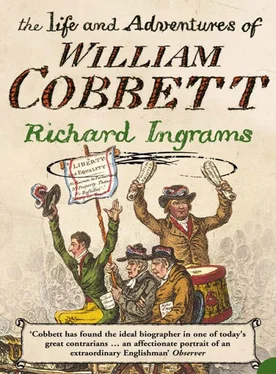Cobbett was not quite such an obedient and dutiful son as this account suggests. His elder brother Tom, who later recounted his memories to Cobbett’s third son James Paul, remembered him as a lively, rather rebellious boy – ‘the foremost in enterprise when anything was on foot, not remarkable for plodding, but rather the contrary, with great liveliness of spirit having a proneness to idle pursuit and to shirk steady work and an obstinate resolution for what he was bent on … He must have promised to turn out rather an ungovernable than a tractable youth. When sent to mind the pigs he would throw off a part of his upper clothes and stray away after some business that better suited his taste.’ 3
Tom also remembered that Bill (as he called him) used to like listening to their father reading bits out of the newspaper of an evening. Cobbett’s daughter Anne records: ‘It was tiresome for the other three boys to have to keep quiet the while but Bill used oftentimes to listen and pay attention to the reading and the others wondered how he could do it. And I’ve often thought it all very dull work, sitting there in their chimney corner obliged to refrain from their own fun.’ Bill was especially interested in speeches from Parliament, and would remind his father of who the various speakers were. Anne also remembered her father telling her how he used to make speeches aloud when by himself, ‘And go out after dark and do so. He said he recollected being on the Common, waving his arms about, and making speeches to the furze bushes.’ 4
It is tempting to read something into the fact that in his own account of his boyhood Cobbett makes scarcely any mention of his mother. The explanation is that to an exceptional degree Cobbett was from the beginning self-centred and self-sufficient. Most of us rely on others close to us, whether friends or family, for help, advice and support. But even as a boy Cobbett did not seem to need other people. Throughout his life he depended almost entirely on his own impressions, his own judgement, his own researches and conclusions. So, in his little autobiography Cobbett is the only character in full colour; the others are monochrome, sometimes not even named. The fact that he makes no mention of his mother and cannot remember his three brothers’ ages is an indication of how little they impinged on his thoughts and needs.
Cobbett left home three times in the course of his boyhood, according to his own account, from no other motive but a love of adventure. His brother Tom, however, suggested that their father was partly to blame. ‘George Cobbett,’ James Paul recorded, ‘was not of a gentle disposition, but subject to violent fits of temper, and we have reason to believe that the harshness of the parent was the cause of the son’s first quitting home.’ More than once in Rural Rides Cobbett refers, in a light-hearted way, to his father’s having beaten him – he told how once, as ‘a very little boy’ he had seen a cat ‘as big as a middle-sized spaniel dog go into a hollow elm tree, for relating which I got a great scolding, for standing to which I at last got a beating, stand to which I still did’. (It seems as if the father had got into the habit of picking on Bill, perhaps because he was the most daring of the four brothers. ‘One summer evening,’ James Paul writes, ‘he and his brothers being all together in their sleeping room, one of them noticed the figure of a crocodile printed in the corner of a large map which their father had hung against the wall and exclaimed “How ugly he looks”. William said “Aye, don’t he? I’ll cut his head off.” The others called out “No, Bill, don’t, father will be so angry.” But that did not stop him. He jumped out of bed, took his knife from his pocket and made a dash at the map, cutting into it right across the crocodile’s neck. Their father, when he came to see, said whichever of them did the mischief he was sure “Bill had a hand in it.”’)
Cobbett was only eleven when, inspired by what a fellow gardener told him while they were working together in the grounds of Farnham Castle, he set off on foot to see Kew Gardens ‘with only thirteen half pence in his pocket’. It was as he was trudging through Richmond on his way to Kew that he caught sight of Swift’s Tale of a Tub (price 3d * ) in a bookseller’s window. ‘The title was so odd that my curiosity was excited. I had the 3d, but, then, I could have no supper.’ He bought the book, went without his supper and read on until it grew too dark. There was something about it which made an indelible impression upon him, so much so that he carried it with him wherever he went, and when he lost it some years later in a box that fell into the sea on his way to North America, the loss gave him ‘greater pain than I have ever felt at losing thousands of pounds’. Why should this satire of Swift’s, directed at the various Christian Churches, have made such an impact on this half-educated farmer’s son, aged only eleven? It is, like all Swift’s work, highly sophisticated – even abstruse – full of subtleties, Latin tags and literary allusions which must have gone over the boy’s head. One can only surmise that what so impressed him, causing what he later called ‘a birth of intellect’, was simply the flow – even the flood – of words, phrases piled on top of one another, broken up with digressions and parentheses, all producing a kind of verbal intoxication, the effect of which was later to bear fruit in Cobbett’s own writing, similarly vigorous and fluent but more direct and down-to-earth, unencumbered by Swift’s vast baggage of learning.
Did Cobbett remember in later life one particular passage from this book which had such a special bearing on his own career?
It is but to venture your lungs, and you may preach in Covent Garden against foppery and fornication, and something else; against pride and dissimulation, and bribery, at Whitehall; you may expose rapine and injustice in the inns of court chapel; and in a city pulpit be as fierce as you please against avarice, hypocrisy and extortion … But on the other side, whoever should mistake the nature of things so far as to drop but a single hint in public, how such a one starved half the fleet, and half poisoned the rest; how such a one, from a true principle of love and honour, pays no debts but for wenches and play; how such a one has got a clap and runs out of his estate; how Paris, bribed by Juno and Venus, later to offend either party, slept out the whole cause on the bench; or, how such an orator makes long speeches in the senate, with much thought, little sense, and to no purpose; whoever, I say, should venture to be thus particular, must expect to be imprisoned for scandalum magnatum ; to have challenges sent to him; to be sued for defamation; and to be brought before the bar of the house.
In the autumn of 1782, when Cobbett was nineteen, he went to stay with an uncle who lived near Portsmouth. Here, from the top of Portsdown, he saw the sea for the first time – ‘and no sooner did I behold it than I wished to be a sailor. I could never account for this sudden impulse, nor can I now,’ he wrote. ‘Almost all English boys feel the same inclination: it would seem that, like young ducks, instinct leads them to rush at the bosom of the water.’ (It is perhaps worth noting that Tom Paine, whose career in so many ways prefigured Cobbett’s, felt the same urge, and like Cobbett was rescued before he signed away his freedom.)
Luckily for Cobbett, when he managed to board a ship in Portsmouth dock the captain, the Hon. George Berkeley, assuming that he was running away from a pregnant girlfriend, persuaded him ‘that it was better to be led to Church in a halter to be tied to a girl that I did not like, than to be tied to the gang-way or, as the sailors call it, married to Miss Roper’. Cobbett blushed at this, which only confirmed Berkeley’s opinion. But it was not enough to deter Cobbett, and when he was on shore again he applied to the Port Admiral to be enrolled. However, his request was turned down – ‘and I happily escaped, sorely against my will, from the most toilsome and perilous profession in the world’. But the experience had given him a glimpse of another world beyond the farm, and he was never able afterwards to resume his work there with equanimity.
Читать дальше











